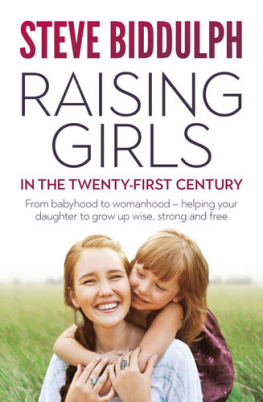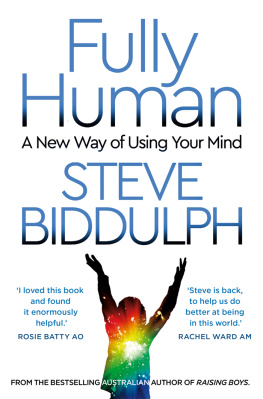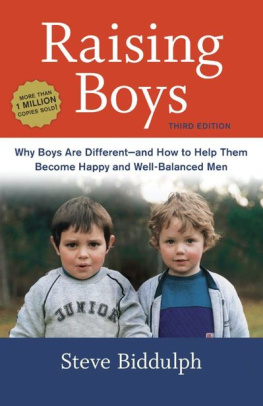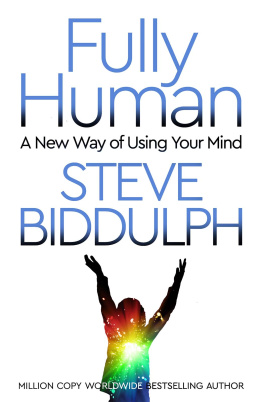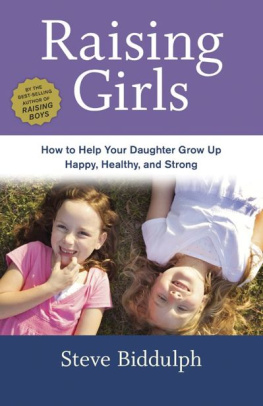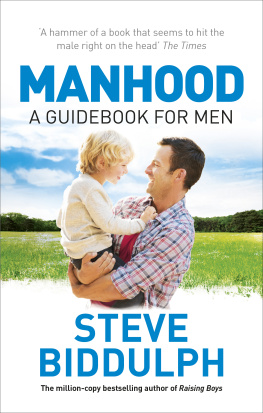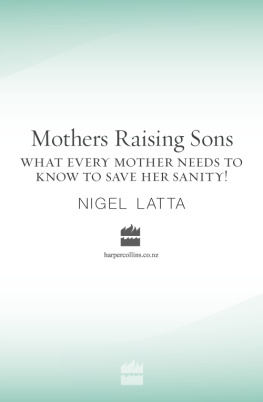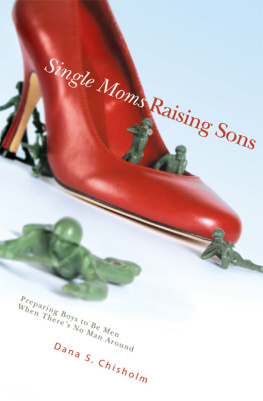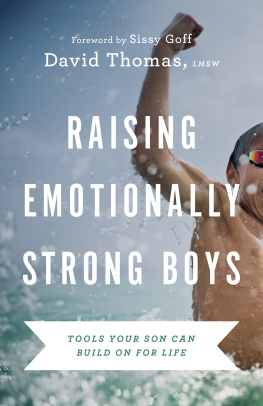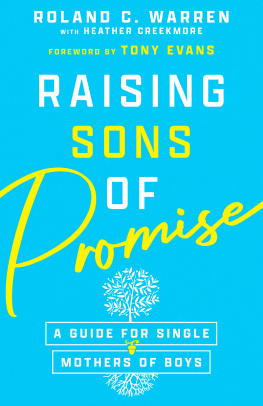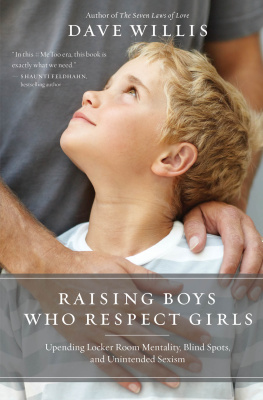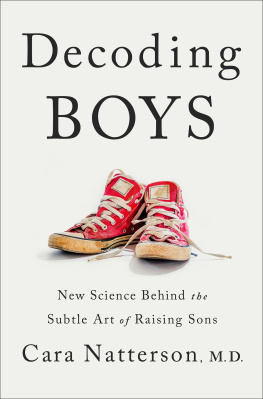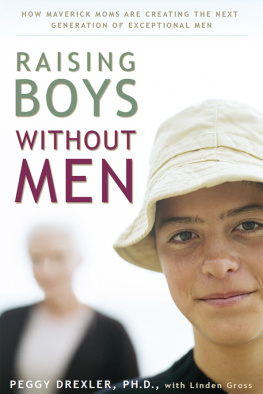Dedicated with appreciation to Joan Biddulph, 1918 2017 for words, laughter and big skies
RAISING BOYS IN THE 21st CENTURY
First published in Australia and New Zealand in 1997 by Finch Publishing as Raising Boys, retitled as Raising Boys in the 21st Century in 2018.
This ebook edition published in 2018 by Simon & Schuster Australia
Simon & Schuster (Australia) Pty Limited
Suite 19A, Level 1, Building C, 450 Miller Street, Cammeray, NSW 2062
A CBS Company
Sydney New York London Toronto New Delhi
Visit our website at www.simonandschuster.com.au
Copyright Steve Biddulph and Shaaron Biddulph 2018
All rights reserved. No part of this publication may be reproduced, stored in a retrieval system, or transmitted in any form or by any means, electronic, mechanical, photocopying, recording or otherwise, without prior permission of the publisher.
Authors notes: The Notes section at the back of this book contains references to the text and useful additional information on specific points mentioned in the chapters. Each reference is linked by page number and relates to a particular section of the text.
Photographs: The photographs in this book have been included to illustrate everyday moments in the lives of people, past and present. However, the people featured in these photographs are in no way connected with the individual stories, characters or situations presented in this book.
Photographic permissions: We are grateful to the following people for their assistance in providing photographs for this book: Paul and Judi Taylor, Narelle Sonter, Jim and Jenny Smith, Elia Bastianon and Tony Wallis, Geoff and Chris Price, Glenda Downing, Chris and Tony Collins, Catherine James and Bruce Stephens, Ella and David Martin, Steve and Shaaron Biddulph, Glenys and Brian Atack, Steve and Henrietta Miller, Miles and Jane Felstead, Zoe Finch, Suzanne Jensen and Ral Lewis, Wendy Pettit and Currumbeena School, Robert and Sue Holloway, Dave Hancock and Tony James, Anne and Levi Atkins, Matthew, William and Patrick Atkins, John Atkins, Kain Curran, Luke, Francis and Raphael Atkins, Stephen and Brendon King, Andrew Atkins, Zac Coleman, Andrew Wade, Jake and Vicki Mawby, Merv Atkins, Luke, Joshua and Jacob Atkins, David and Jonathon Atkins, Kerri Burgers, iStockphoto and Dreamstime.com.
Permissions: The Author gratefully acknowledges the permission of the following for the right to reproduce copyright material in this publication: What Fathers Do, by Jack Kammer, is reprinted from Full-Time Dads, May/June 1995 Issue, with the permission of the author. The segment of the article, Mid School Crisis, by Jane Figgis, is reproduced with the permission of the Sydney Morning Herald. Sarah MacDonalds article, The Secret Life of Boys first appeared in Daily Life, www.dailylife.com.au, on May 8 2012. Used with kind permission of the author.
Every effort has been made to obtain permission from the last known copyright holder for all the quotes and extracts used in this book.
ISBN 978-0-6482-2673-4
Illustrations by Paul Stanish
Text design by Julianne Billington, text updates by Meg Dunworth
Cover design by Ingrid Kwong
A note from Steve

The aim of this book is to help you think, and feel, deeply about your job of being a parent so you can do it more consciously and with more confidence.
Treat it as a springboard, an arm around your shoulders or a pair of wings to lift you up and see the bigger picture. But dont treat it as a prescription.
Nobody can tell you how to raise your child, and if you ever see the words parenting expert you should run a mile. I am not one of those I simply offer these thoughts to help you figure out your own.
Make up your own mind. Thats what you are in the world to do.
Much love and courage,
Steve B.
Boyhood has changed
Boyhood is transforming thats it in a nutshell. If youve been at any school gate or in online conversations over the past twenty years, youll know that things are on the move. Were learning how to make boyhood a happier place, and that knowledge is saving lives.
This book you hold in your hand was warmly welcomed across the globe, in many different cultures because it did something very practical. It said if we want boys to grow up well to become kind, safe and open-hearted men then we have to understand their specific needs. Just as with girls, specific risk factors go with being an average boy. These range from the everyday to the truly terrible: from not liking school at four, to having three times the risk of dying in their teens (mostly from car accidents, suicide or violence). Boys have nine times the chance of going to jail. These are not small things. But if we understand what makes our boys unique, we can love them better and make sure they turn out well.
Today we understand that gender is on a continuum. Knowing a child is a boy or a girl doesnt tell you anything, necessarily, about what they will be like. But although gender is a line, there are big bumps on that line, and so we can say most boys and most girls without meaning it has to apply to all. Most boys are slower at learning to talk, and reading or writing, than most girls. Most start puberty a year or two later than girls. (Girls puberty is over by age 14, and they have shot up to their full height. Boys puberty doesnt end until they are about 17, and their brain doesnt fully mature until their twenties.) These things matter if you have a boy to raise, and keep alive.
The differences are not just on the outside. The evidence grows and grows that boys chemistry is very different from early in the womb, predisposing most of them to greater muscle mass, more need for movement and activity, an excitement about competition, and a love of concrete ways of learning. Though there are definitely some girls who are like this, and boys who are not. Keep remembering that mantra most, not all.
Boys brains develop more slowly, and their nervous system wires up in a different sequence, and that is a massive thing because it means that boys start school way too young , and often hate it because its too formal, too much based on sitting still. Good schools for boys are the ones that give them room to move, and time to grow.
There are other great changes afoot. Understanding that some boys are gay or transgender and thats normal and okay , has helped millions of parents be more relaxed and accepting of their own unique boy. In fact, its made every boy and girl a lot freer to be themselves. Less homophobia means that all boys can have warm friendships, cry when they are sad, be affectionate, and have much better mental health as a result.
Our growing awareness of the autism spectrum has brought great relief to thousands of parents and kids. We can all relax about being a little bit or very different. We are valuing and appreciating kids who dont quite fit the traditional mould.
Of course, there is SO much more in this book. Information about the three stages of boyhood. How to keep boys safe. Boys and housework! New information about the changes boys go through at four, and again at eight that all parents need to know about. And the powerful message that men have an equal part to play in raising children . Kids need to know men of every kind creative, practical, brave, shy, funny and of every different race and sexuality. Then boys can base their own masculinity on a broad choice of role models. And girls can see every possible kind of man.

